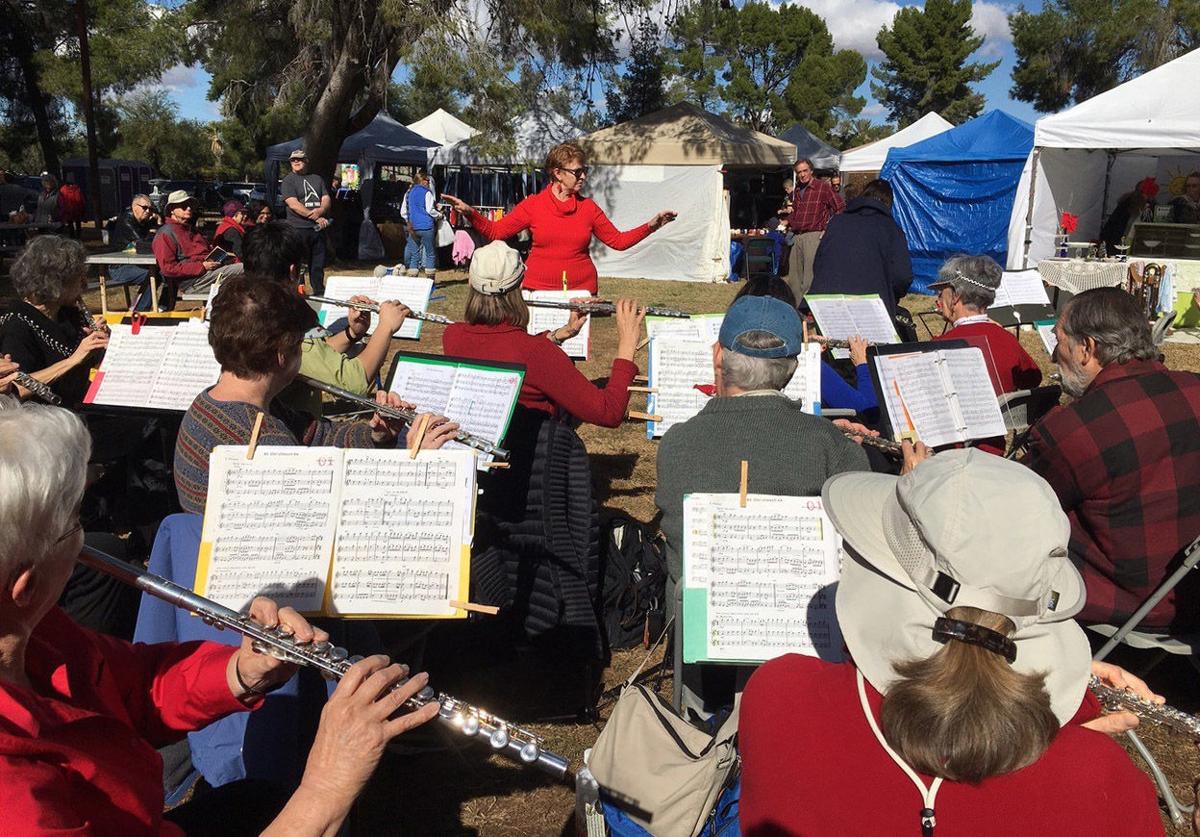For the past 50 years, the Tucson Flute Club has given voice to thousands of flutists, flute enthusiasts and music lovers.
“The flute is so much like a voice: It resonates in the sinus cavities and inside the mouth, so you can pass one flute around to a bunch of different players and they all create different sounds. It is a very personal instrument that just has a beautiful quality of sound that is often better than voices for expression,” said Sandy Schwoebel, president of the nation’s second-oldest continuously operating flute club.
The nonprofit will mark the milestone with A Gala Golden Anniversary Concert: Celebrating 50 Years With 50 Flutes at 2 p.m. Sunday, March 8, at The Sanctuary of St. Philip’s Episcopal Church, 4440 N. Campbell Ave.
Schwoebel attributes the longevity of the club — founded by the late Philip Swanson, a UA professor of flute — to the fact that it focuses on providing an outlet for playing the flute as opposed to simply studying the instrument.
“The people in the Tucson Flute Club want to play. Many flute clubs just sponsor concerts and workshops that feature visiting musicians, but this group is interested in performing. They get together several times a month in a flute-choir format and perform concerts ... and that has created excitement for all these years,” said Schwoebel, a 28-year veteran of the club who holds a doctor of musical arts degree in flute performance from the Cleveland Institute of Music.
The club’s repertoire includes adaptations and arrangements of familiar melodies, classical pieces and original compositions for the flute choir. It performs at local retirement centers and skilled nursing facilities; churches; baseball games and other sporting events; community centers; and numerous special events. It has also presented joint concerts and performed at the National Flute Association Convention with the Phoenix’s Arizona Flute Society.
The club also participates in fundraising events and supports local nonprofits. It has raised more than $5,000 for the Community Food Bank and performs outreach with local schools.
“We collect flutes that people no longer want and repair them, then donate them to schools so they can distribute them to students who can’t afford their own instruments. We also have an outreach project with Flowing Wells School District in which members of our club who hold advance degrees in flute go into the junior high and high school to work with flute players to help them become better players,” said Schwoebel.
The club itself caters to a wide range of players in the flute’s multitude of shapes and forms. The instrument, which vies with the drum as the oldest musical instrument in history, varies in length from 8 inches to more than 6 feet.
“Our group features more than 50 musicians who play everything from the smallest flute, the piccolo, to one of the largest flutes, the contrabass flute. We welcome flute players at all levels,” said Laurie Mering, a 10-year club member and coordinator of the upcoming concert.
Mering said the club prides itself on diversity. It encourages amateurs players, professionals and everyone in between and is open to players of all ages: The youngest members are teenagers and the oldest is 93. Five original members still play with the group. Additionally, several members are conductors for high school bands, so high school students periodically join the group.
“We have newcomers as well as people who haven’t played for a long time. Some people played in high school or college and then abandoned the flute while they raised their kids and may just be picking it up again, while others began playing as retirees. Other members have played for many years at a high level. Some play in the symphony and some give lessons, so there are many opportunities to re-enter the flute world with our club,” said Mering.
Schwoebel said the golden anniversary concert provides a one-a-kind opportunity for the public to see the club in action and hear the world premiere of “Southwestern Sketches,” which renowned composer and conductor Ricky Lombardo wrote and dedicated to the Tucson Flute Club.
The piece is comprised of three movements: Tucson, Cactus Flower and Coyote Chase, described by Schwoebel as “so much fun to play; it really gives the sense that coyotes are running around and sneaking up on you.”
Lombardo will be in Tucson for a week, working with the flute choir and small ensembles in preparation for the concert, which will also include arrangements of traditional American folk songs and classical pieces.
Schwoebel said the instrumentation includes piccolo, C flute, alto flute, bass flute and contrabass flute and encompasses six octaves to produce a rich, textured orchestral sound.
“Ricky Lombardo is quite well known in the flute choir realm. A choir is five or more flutes, and he has some pieces for five different parts and some for up to 12 different parts,” Schwoebel said. “He has a real knack for making these pieces interesting to the audience and for making the choir sound really full and fun. He just does a fabulous job and this is a really special opportunity for all of us in Tucson.”





